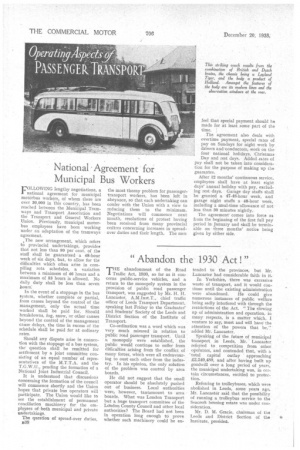"Abandon the 1930 Act ! "
Page 48

If you've noticed an error in this article please click here to report it so we can fix it.
THE abandonment of the Road 1 Traffic Act, 1930, so far as it concerns public-service vehicles, and a return to the monopoly system in the provision of 'public road passenger transport, was suggested by Mr. H. H. Lancaster, A.M.Inst.T., chief traffic officer of Leeds Transport Department, speaking last Friday to the Graduates' and Students' Society of the Leeds and District Section of the Institute of Transport.
Co-ordination was a word which was very much misused in relation to public road passenger transport. Until a monopoly • were established, the public would continue to suffer from difficulties arising from the conflict of many forces, which were all endeavouring to oust each other from the industry. In his opinion, the only solution of the problem was control by area boards.
He did not suggest that the small operator should be absolutely pushed out of business. Local authorities were, however, tantamount to area boards. What was London Transport but a huge transport committee of the Ldndon County Council and other local authorities? The Board had not been in operation long enough to prove whether such machinery could be ex tended to the provinces, but Mr. Lancaster had considerable faith in it.
In Yorkshire, there was excessive waste of transport, and it would continue until the existing administration were abandoned. He could give numerous instances of public welfare being sadly interfered with through the restrictions of the Act. "The slowing up of administration and operation, in many respects, is a matter which, I venture to say, must and will have the attention of the powers that be,'! added Mr. Lancaster.
'Speaking of the future of municipal transport in Leeds, Mr. ' Lancaster referred to competition from other. operators, and contended that, with a 'total capital outlay approaching' £3,549,480, and after having built up goodwill over a long period of years, the municipal undertaking was, in certain circumstances, entitled to protection.
Referring to trolleybuses, which were abolished in Leeds, some years ago, Mr. Lancaster said that the possibility of running a trolleybus service to the Seacnaft housing estate was under consideration.
Mr. D. M. Gracie, chairman of the Leeds and District Section of the Institute, presided.




















































































